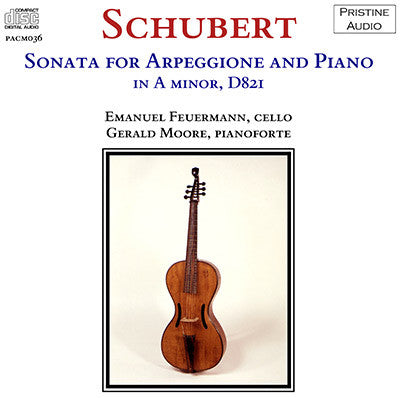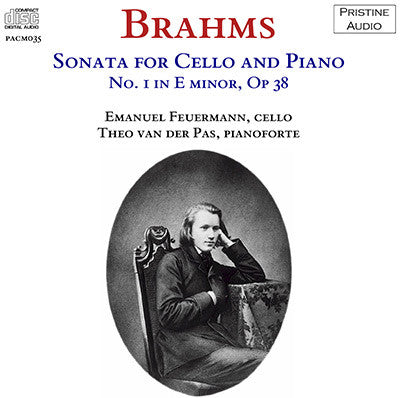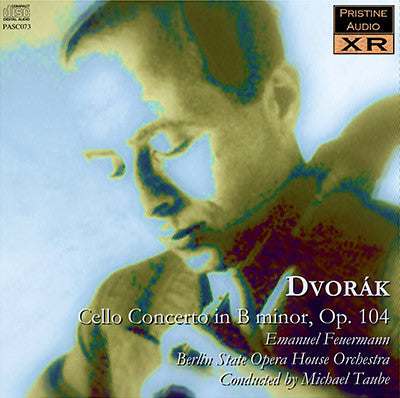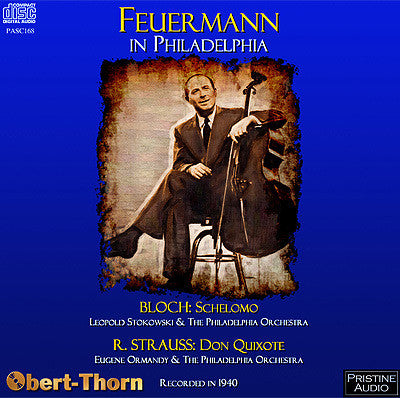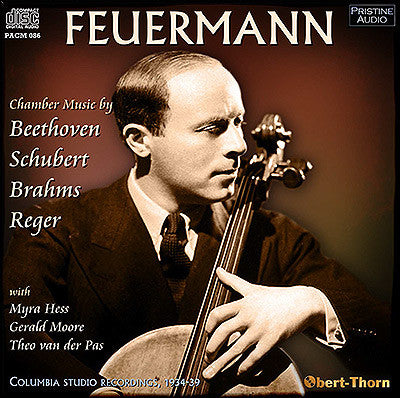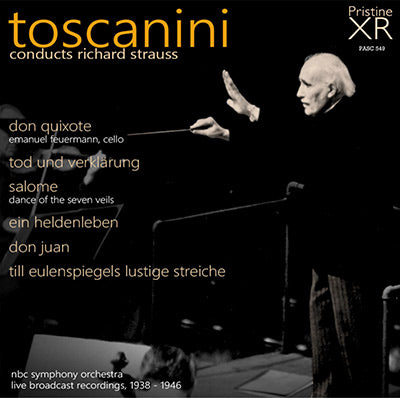Emanuel Feuermann
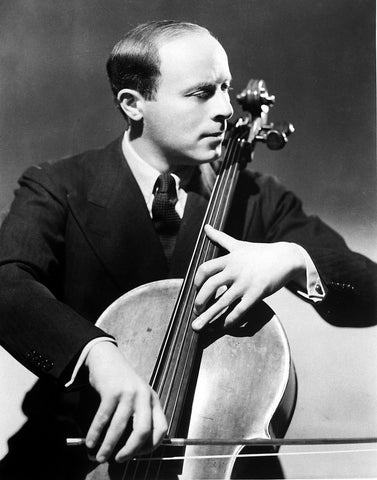
Emanuel Feuermann (November 22, 1902 – May 25, 1942) was an internationally celebrated cellist in the first half of the 20th century.
Feuermann was born in 1902 in Kolomyja, Galicia, Austro-Hungarian Empire (now Kolomyya, Ukraine) to Jewish parents. Both of his parents were amateur musicians. His father, who played the violin and cello, was his first teacher. His older brother Sigmund was also musically talented,and their little sister, Sophie (b. January 1908) was the piano prodigy in the family. Their father decided to move the family to Vienna in 1907 for Sigmund to start his professional career there. At the age of nine, Emanuel received lessons from Friedrich Buxbaum, principal cello of the Vienna Philharmonic, and then studied with Anton Walter at the Music Academy in Vienna. In February 1914, the eleven-year-old prodigy made his concert debut, playing Joseph Haydn's Cello Concerto in D major with the Vienna Philharmonic under Felix Weingartner.
In 1917, Feuermann went to Leipzig to study with legendary cellist Julius Klengel. In 1919 cellist Friedrich Wilhelm Ludwig Grützmacher (1866–1919), the nephew of Friedrich Wilhelm Grützmacher, died, and Klengel recommended Feuermann for Grützmacher's position at the Gürzenich Conservatory in Cologne. He was also appointed principal cellist of the Gürzenich Orchestra, by its conductor (who was also the conservatory director), Hermann Abendroth. Feuermann also, as part of the position, became cellist of the Bram Elderling Quartet. At that time, he also joined a short-lived piano trio with his brother and pianist-conductor Bruno Walter.
In 1929, Feuermann became professor at the Musikhochschule in Berlin and taught there for the next four years. He performed during this time with violinists Carl Flesch, Szymon Goldberg, Joseph Wolfsthal and composer Paul Hindemith, the latter playing viola in a string trio with Feuermann and Wolfsthal (later Goldberg; see below). He also performed with Jascha Heifetz, William Primrose and Arthur Rubinstein.
On April 3, 1933, the newly installed Nazi regime dismissed him from his position at the Berlin Conservatory due to his Jewish origin. He moved to London along with Goldberg and Hindemith, where the trio recorded Beethoven's early Serenade in D major for string trio, Op. 8, and a string trio by Hindemith, for Columbia Records. He toured Japan and the United States then returned to London, where he married Eva Reifenberg in 1935 with whom he had a daughter, Monica. Following the premiere of Arnold Schoenberg's Cello Concerto under Sir Thomas Beecham he lived for some time in Zürich, Switzerland, but happened to be in Vienna at the time of the 1938 Anschluss. Violinist Bronisław Huberman helped Feuermann and his family escape to British Palestine. From there they moved to the United States later that year.
He taught privately, and at the Curtis Institute of Music in Philadelphia, until his death. Among his notable pupils were Bernard Greenhouse, Suzette Forgues Halasz, Robert Lamarchina, Alan Shulman, David Soyer and August Wenzinger.
In the United States, he made several celebrated chamber-music recordings with Heifetz, Rubinstein and others. His relationship with Hindemith suffered when the latter chose Gregor Piatigorsky to premiere his Cello Concerto.
Feuermann died in New York City due to complications during surgery for hemorrhoids, on May 25, 1942. aged 39.
Klengel wrote of Feuermann, "Of all those who have been entrusted to my guardianship, there has never been such a talent...our divinely favoured artist and lovable young man."
Heifetz declared that talent like Feuermann's comes once every one hundred years. Indeed, after Feuermann's untimely death it took seven years for Heifetz to collaborate with another cellist, Gregor Piatigorsky. Arthur Rubinstein also declared Feuermann to be "the greatest cellist of all time", even by direct comparison with Pablo Casals. Both Heifetz and Rubinstein were longtime trio partners with Feuermann.
During his first tour of the United States in 1935-36, Feuermann reaped enthusiastic reviews from music critics. After a 1938 Proms performance in London, critic Reid Steward of The Strad wrote "I do not think there can any longer be doubt that Feuermann is the greatest living cellist, Casals alone excepted..."
The honorary pallbearers at his funeral included some of the greatest musicians of the time: pianists Rudolf Serkin and Artur Schnabel, violinists Mischa Elman and Bronisław Huberman, and conductors George Szell, Eugene Ormandy and Arturo Toscanini. During the procession Toscanini broke down crying, exclaiming, "This is murder!"

Emanuel Feuermann
Emanuel Feuermann (November 22, 1902 – May 25, 1942) was an internationally celebrated cellist in the first half of the 20th century.
Feuermann was born in 1902 in Kolomyja, Galicia, Austro-Hungarian Empire (now Kolomyya, Ukraine) to Jewish parents. Both of his parents were amateur musicians. His father, who played the violin and cello, was his first teacher. His older brother Sigmund was also musically talented,and their little sis...
SCHUBERT Arpeggione Sonata in A minor, D.821
Recorded 29 & 30 June, 1937, Abbey Road Studio 3, London
Duration 19:55
Emanuel Feuermann, cello
Theo van der Pas, piano
BRAHMS Cello Sonata No. 1 in E minor, Op. 38
Recorded 10 & 11 July, 1934, Abbey Road Studio 3, London
Duration 19:55
Emanuel Feuermann, cello
Theo van der Pas, piano
DVOŘÁK Cello Concerto
Recorded in 1928/29
Duration 33:23
Emanuel Feuermann, cello
Berlin State Opera Orchestra
conducted by Michael Taube
BLOCH Schelomo
R. STRAUSS Don Quixote
Recorded in 1940
Total duration: 58:08
Emanuel Feuermann, cello
The Philadelphia Orchestra
conducted by Leopold Stokowski and Eugene Ormandy
SCHUBERT Arpeggione Sonata in A minor, D.821
BRAHMS Cello Sonata No. 1 in E minor, Op. 38
REGER Suite for Unaccompanied Cello in G Major, Op. 131c, No. 1
Recorded 1934-39
Total duration: 72:59
Emanuel Feuermann, cello
Myra Hess, piano
Gerald Moore, piano
Theo van der Pas, piano
STRAUSS Don Quixote
STRAUSS Tod und Verklärung
STRAUSS Salome - Dance of the Seven Veils
STRAUSS Ein Heldenleben
STRAUSS Don Juan
STRAUSS Till Eulenspiegels lustige Streiche
Live broadcast recordings, 1938-46
Total duration: 2hr 26:47
Emanuel Feuermann, cello
NBC Symphony Orchestra
conducted by Arturo Toscanini

